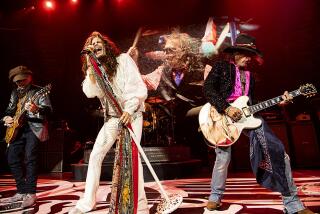South Africa’s Johnny Clegg returns to U.S. for ‘The Final Journey’ tour
Throughout his 40-plus year career, South African musician Johnny Clegg has sought to explore connections between body and spirit, between aspirations and reality, between politics and society.
That search, which often manifested in intense performances in which he tapped Zulu dance traditions he began studying as a teenager, has turned that much deeper in the two years since he was diagnosed with pancreatic cancer.
“I’m not looking for some objective truth about my life,” Clegg, 64, said recently by phone from his home in Johannesburg, shortly before heading out for a limited North American tour he has dubbed “The Final Journey.”
“I know my life is a web of connections with other people and other cultures, other worldviews. They have nourished me and my imagination, given me an identity and widened my horizons.”
See the most-read stories in Entertainment this hour »Through his various musical connections — from his first band to gain notoriety, Juluka, and then Savuka, to the last couple of decades touring and recording under his own name — Clegg has helped widen horizons for countless listeners within and outside his native land with his infectious blend of Western rock and African traditional music.
But his cancer, which is in remission following surgery and rounds of chemotherapy, has become the focal point of his life, and prompted his decision to make one more round of shows abroad while he is feeling strong enough to weather the rigors of international travel.
“I don’t know what’s going to happen — nobody knows,” he said. “But while I’m strong and able to do stuff, I wanted to do a nice, big Final Journey tour.” That tour opens Saturday in Boston and comprises 13 shows in a dozen cities in the U.S. and Canada, reaching Southern California for an Oct. 30 date at the Balboa Theatre in San Diego.
One of the revelations for him has been the transformative power his music has not just on audiences, but on himself.
“I have terrible neuropathy,” he said. “As a dancer, it’s been a real challenge, and some nights I’ve forced my way through it. Sometimes I feel like I’m on ice, or like I’m walking on coals, and it’s absolutely unbearable. I feel like an Indian fire walker.
“But when I get onstage, something switches all those messages off,” he said. “I do the show, and then I pay the price a little bit afterward. But you know what? It’s the most amazing transformation. And I’d rather have my feet on fire for a bit after than the other way around. I’m very, very Zulu in my head space on that: I’m feeling good and very lucky and fortunate to do this now.”
He’s accompanied by several musicians who have been at his side for 10 or 20 years or more, including singer Mandisa Dlanga, who has been in his touring band since the 1980s, and guitarist Andy Innes, who has been along for the ride for a quarter century. His band also includes his 29-year-old son, Jesse, whom he sang about shortly after he was born in 1988, in the title track from his 1989 album “Cruel, Crazy, Beautiful World.”
Jesse Clegg has followed in his father’s footsteps into music, but focuses more on pop and electronic elements in his own recordings. While joining his father on the Final Journey tour, Jesse is also playing some headline shows of his own, including a stop Nov. 7 at the Hotel Café in Hollywood.
Johnny Clegg said his show “is an autobiographical story. There’s an audiovisual component to it that’s an important part of the show. But I don’t have a script. I have a general idea of what I want to say, and every night it’s different.”
A significant part of Clegg’s story is creating the first interracial rock band in South Africa in the 1970s, when any such mixing among races was still illegal under the country’s apartheid system of institutional segregation.
Clegg on occasion had run-ins with the law for collaborating with black musicians, but persisted.
On his 1987 album with Savuka, “Third World Child,” he included “Asimbonanga,” an elegiac ballad saluting imprisoned South African activist Nelson Mandela. When Mandela was released after 27 years, the former political prisoner joined Clegg onstage in South Africa at a celebratory concert, and Clegg performed at all four of Mandela’s 46664 AIDS Awareness concerts in South Africa and Norway.
The “Third World Child” album included the song “Great Heart,” which Jimmy Buffett subsequently recorded. Clegg’s best-known song among many Western fans is “Dela,” which was featured prominently in the 1997 live-action film “George of the Jungle” with Brendan Fraser, and which he often uses to joyously cap his concerts.
Over a span of five months recently, he recorded a new studio album, “King of Time,” which is due for release to coincide with the North American tour.
Of the title track, Clegg said, “Musically it’s a very danceable mix of dance music and Zulu concertina and Western melodies with some Zulu chants. The title means ‘I lasted.’ For four decades. It’s about how one deals with the passage of time and how one can reconfigure time. To reincarnate yourself over decades is a great challenge.”
He also has recorded a new live album his recent shows in Europe, and expects that collection to be released in the months ahead.
In addition, Clegg has been working on a formal autobiography, which he expects to publish next year. As with other avenues of creative expression, he said he’s ever attentive to the idea of connection, and he elucidates the idea with the eloquence he brought to bear during his years as a lecturer in anthropology at the University of Witwatersrand.
“The thing about all of this is that everybody has some sense of ‘My story started here, I did these, these opportunities happened and I became this, and maybe this was part of a predestined path.’ We all go through those kinds of attempts to understand, to make coherence out of our situations, which are possibly quite grim.
“It’s just a matter of human beings making meaning,” he said. “That’s what makes great artists, what makes great painters, great choreographers — that in the time that you are given, you make connections, and those connections are manufactured. They’re not in the real world; they are in your imagination. And If you have a strong imagination, you can get over anything.”
Follow @RandyLewis2 on Twitter.com
For Classic Rock coverage, join us on Facebook
More to Read
The biggest entertainment stories
Get our big stories about Hollywood, film, television, music, arts, culture and more right in your inbox as soon as they publish.
You may occasionally receive promotional content from the Los Angeles Times.






